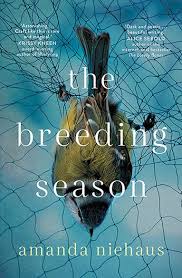Amanda Niehaus’ debut novel The Breeding Season (Allen and Unwin 2019) is a well-crafted, beautifully rendered meditation on grief, loss, sex and death. Niehaus has used her background as a scientist to build complex scaffolding around the interrogation of ideas such as reproduction, regeneration and fertility, and her own experience of illness and grief has informed the novel’s nuanced exploration of loss. This is a book that reads so fluently, and yet is written in literary language and packed with complicated themes. It is a book that will break your heart.
Scientist Elise and her writer husband Dan, living in Brisbane, are coming to terms with the terrible loss of their child. Each has retreated into their own private grief; they come together occasionally, like pinballs bouncing off each other, neither able to provide the comfort or solace that the other needs. Their individual sorrow is debilitating, and with each of them losing themselves, it is no wonder that they are unable to find each other. I cared so much about these characters: each lost, each struggling. They are flawed and misguided, their loyalties are muddled, their mistakes are selfish, they are tested again and again – but they are so human, so familiar and fallible, so misunderstood, they are under so much stress and strain that it is no wonder they flail about. This is a portrait of a couple in crisis, depicted with compassion and tenderness and empathy.
But alongside this life-changing personal tragedy that threatens to tear them apart, they each have their work. Elise studies antechinuses, small Australian marsupials with interesting reproductive patterns and behaviours. She retreats to the isolation of field work in an attempt to heal. Dan is ghost-writing a memoir for his uncle, a man he has never met, a famous artist whose controversial paintings of the genitalia of his (then) 15-year-old muse have marked him as a man difficult to know and even more difficult to understand. Both Elise and Dan have fascinating family of origin stories that are gradually revealed as the book develops; neither is a stranger to the suffocating responsibility and cruel injuries that can be inflicted by family.
Chapters are told in alternating perspectives of these two main characters, combining to show the depths of despair into which grief makes us fall. Elise and Dan are both floundering around in their own distress, unable to reach for each other or connect, barely surviving themselves. The author writes with great insight of the unravelling of the self when exposed to loss; she writes with visceral tenderness of sex and desire and yearning; she invokes the roles of art and science in possible redemption. This is a story about the large betrayals and mistakes we make when our life seems to be careening out of control, and about the many smaller betrayals we inflict almost unconsciously, both on ourselves and on those we care about.
The language is unusual – the occasional made-up hybrid word that makes perfect sense, the unconventional spacing, the opposing ideas (in brackets) that manage to show two sides of the same coin.
And, of course, it is about nature, with all its predictabilities and inconsistencies, all its structure and chaos. The title – The Breeding Season – refers to so many aspects of this novel, all revolving around sex and mating, impregnation, birth and death. The cycle of life.
This book will cut to the quick with its razor-sharp observations of the complex love and loss of parenting – anyone who has children, or who has lost children, those who have longed for children or abandoned them or had to give them up, anyone who is not a parent but who has children in their life that they care about. And it also speaks about adult children and their parents, and the great misunderstandings and harms and estrangements that can occur, sometimes without you even realising it is happening. This novel is so full of ideas and theories, dreams and hypotheses, questions that will continue to reverberate long after the last page. And the ending … as is fitting in this book of opposites, of balance, of yin and yang … the ending is both devastating and yet hopeful.

